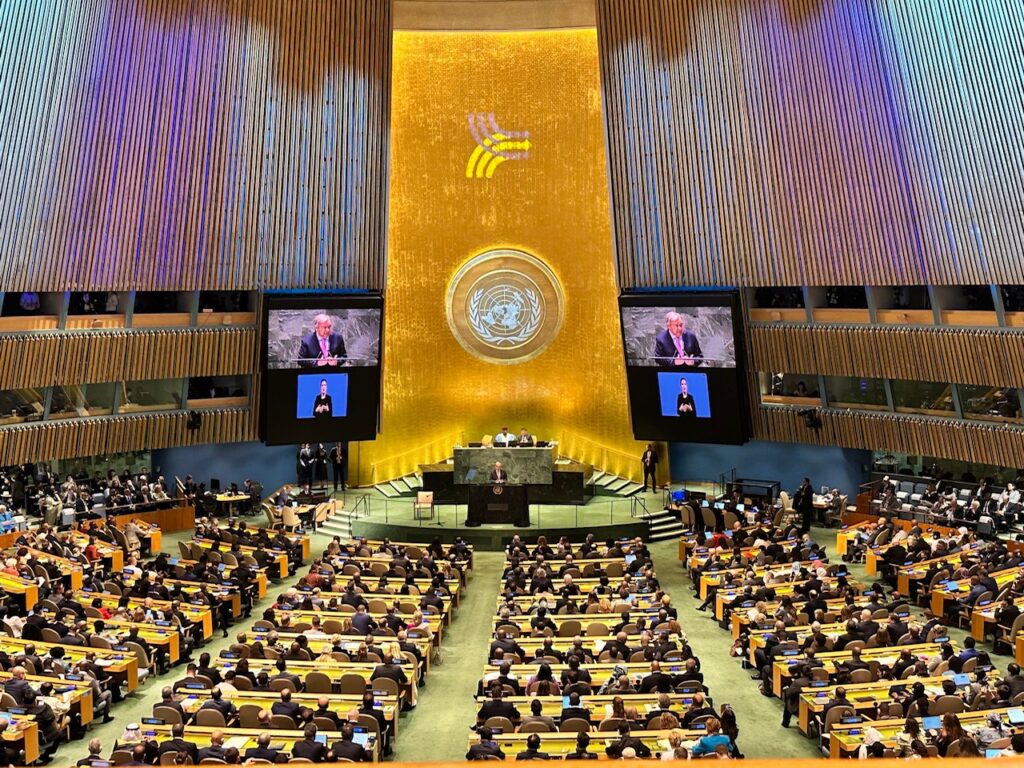New York, September 22, 2024 – Against a backdrop of conflicts in the Middle East, climate disasters and desperate humanitarian needs in many countries, United Nations member states have adopted an ambitious Pact for the Future to try to bring solutions to current global crises.
The decision to adopt the 56-page Pact was taken in the UN General Assembly without a vote by the 193 members after Russia and allies introduced a last-minute amendment to stop the vote. The assembly voted 143-7 to reject the amendment while 15 countries abstained.
The seven countries that voted against the adoption of the Pact are Russia, Belarus, Nicaragua, North Korea, Iran, Syria and Sudan. The 15 countries that abstained included China, Cuba, Iraq, Laos, Malaysia, Pakistan, Saudi Arabia and Sri Lanka.
Read the resolution containing the Pact for the Future here.
The adoption of the Pact took place on the first day of the Summit of the Future September 22-23, which the UN said is a once-in-a-generation bold attempt to reform decades-old international institutions, including the politically powerful UN Security Council and international financial organizations. The UN said the just adopted Pact is the product of lengthy negotiations between governments for action-oriented programs.
The Pact contains chapters dealing with sustainable development and financing for development; international peace and security; science, technology and innovation and digital cooperation; youth and future generations; and transforming global governance.
The UN said the Pact has “the potential to promote a multilateral system that reflects the realities of today and that delivers for everyone, everywhere.”
The Summit for the Future is to produce also a global digital compact and a declaration on future generations that will be annexed to the Pact.
The UN said Germany and Namibia, the two countries that sponsored the Pact, greeted the adoption. “We need the Pact for the Future more than ever,” said Olaf Scholz, Chancellor of Germany, emphasising that it is a compass to guide us to a better world. “You have proved that multilateralism is alive. The future starts now.“
President Nangolo Mbumba of Namibia recalled an African proverb that says tomorrow belongs to the people who plan today.
“The Summit of the Future is a timely and urgent call to action, urging us to choose the path of peace and sustainability for all,” he said. “We come together to forge a brighter future. Global problems require global solutions.”
The UN said some of the promises made by world leaders in the Pact are:
- We will end hunger and eliminate food insecurity and all forms of malnutrition.
- We will ensure that the multilateral trading system continues to be an engine for sustainable development.
- We will invest in people to end poverty and strengthen trust and social cohesion.
- We will strengthen our efforts to build peaceful, just and inclusive societies.
- We will achieve gender equality and the empowerment of all women and girls.
- We will strengthen our actions to address climate change.
(By J. Tuyet Nguyen)
United Nations journalists – United Nations journalists – United Nations journalists
United Nations News – United Nations News – UN Correspondents Association – UNCA Awards This will be achieved through an action-oriented o

